This post is sponsored by OMRON Healthcare, but this story is my own.
Now is as good of a time as any to come clean about an issue I’m facing that I haven’t been doing my best to deal with. It’s a health concern in my family and something that dances at the back of my mind often, something I need to do more about, something I should not continue to ignore. The thing I’m talking about is blood pressure. My family has a history of hypertension, and lately when I’ve checked my pressure has been higher than I know it should be. I’m sharing this because I know I’m not alone in being affected by this issue. This post is going to be real and there are parts that may be sad – just as forewarning as you continue reading. I wanted to do this campaign to raise my own awareness and put it out there for others to consider as well because I believe it’s especially important for the Black community. I thought I knew enough about blood pressure, but it turns out there’s still so much more to learn.
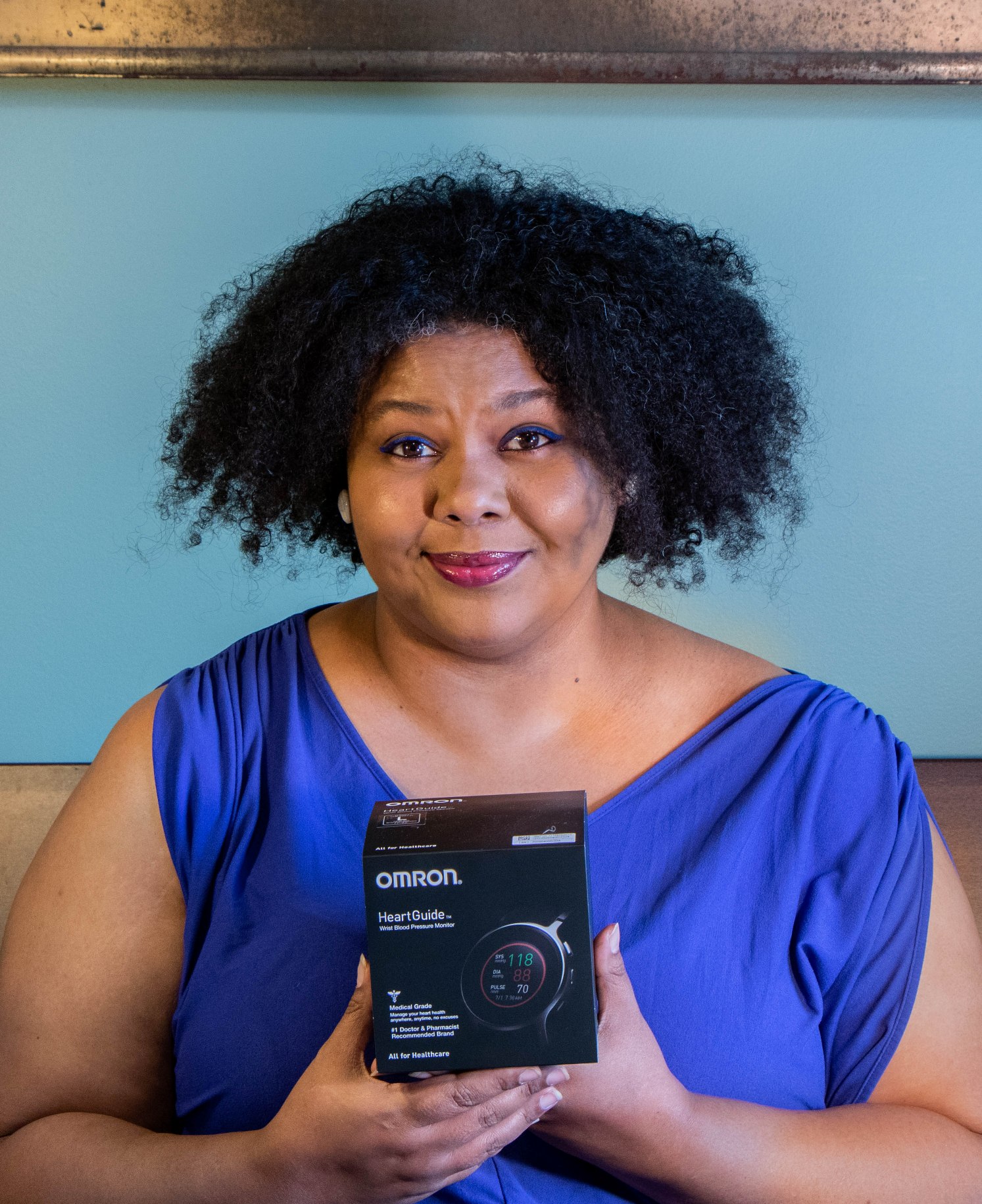
Throughout my life, I have seen the ways my mother has been physically, mentally, and emotionally affected by hypertension. When I was a kid, going out with her shopping or sightseeing when we went on a trip was frustrating to me because she would always need to go slow and then rest, sometimes cutting adventures short because she didn’t feel well. I was too young to understand what she was going through. Hypertension often caused her to feel dizzy or light-headed, or weak and tired. That lightheadedness is an indication that her blood pressure is rising. My mom describes it as feeling “giddy.” “You start to feel up in your temple, you get lightheaded like you have had too much to drink,” she explains.
For my mom, hypertension began for her with her first pregnancy. “It began with my first child. From 1961 I have been on high blood pressure pills of all kinds; it went on with each baby. And if you get pregnant, you must tell the doctor about that history. You must,” she cautioned me in a recent phone conversation. Before I was born, my mother had a miscarriage as a result of high blood pressure, anxiety, and job stress. The loss remains traumatic. In speaking to her about this topic, she wanted me to warn my readers. You may not think or know that you have hypertension, but as you get older, you need to try to be regularly aware of your baseline blood pressure. Not just when you go to the doctor’s office. Try to know on a routine basis. Just to monitor your own situation and keep things regulated. There’s a reason this thing is called “the silent killer.”
Maybe it was naïve to assume I would somehow dodge this hereditary bullet. My mom is warning me to pay closer attention. “It’s in the family. Your sister has it, my mummy had it, I have it, so I am cautioning you, Patrice if that isn’t genetic, then I don’t know what is.” OK, mom. Duly noted. I need to do better. Occasionally using the public blood pressure cuff at the supermarket isn’t enough anymore.
This is a good place for me to admit that I’m not great at regularly monitoring my own blood pressure. Despite having a mom who has had these issues so far, I’ve been ok – knock on wood. Once I crossed into my forties, I started noticing that when I go to the doctor my blood pressure tends to be elevated. My GP and the nurses have attributed it to White Coat Syndrome, a commonplace occurrence where visiting the doctor or going to a hospital results in blood pressure that’s higher than normal. My doctor hasn’t put me on meds yet. But given my genetic medical history, I can’t help but feel that it’s a matter of time. It’s time to make a change for the better and get in front of this if I can. The fact has become clear, it’s time to be intentional about regularly monitoring my blood pressure and doing what I need to do to improve my own awareness.
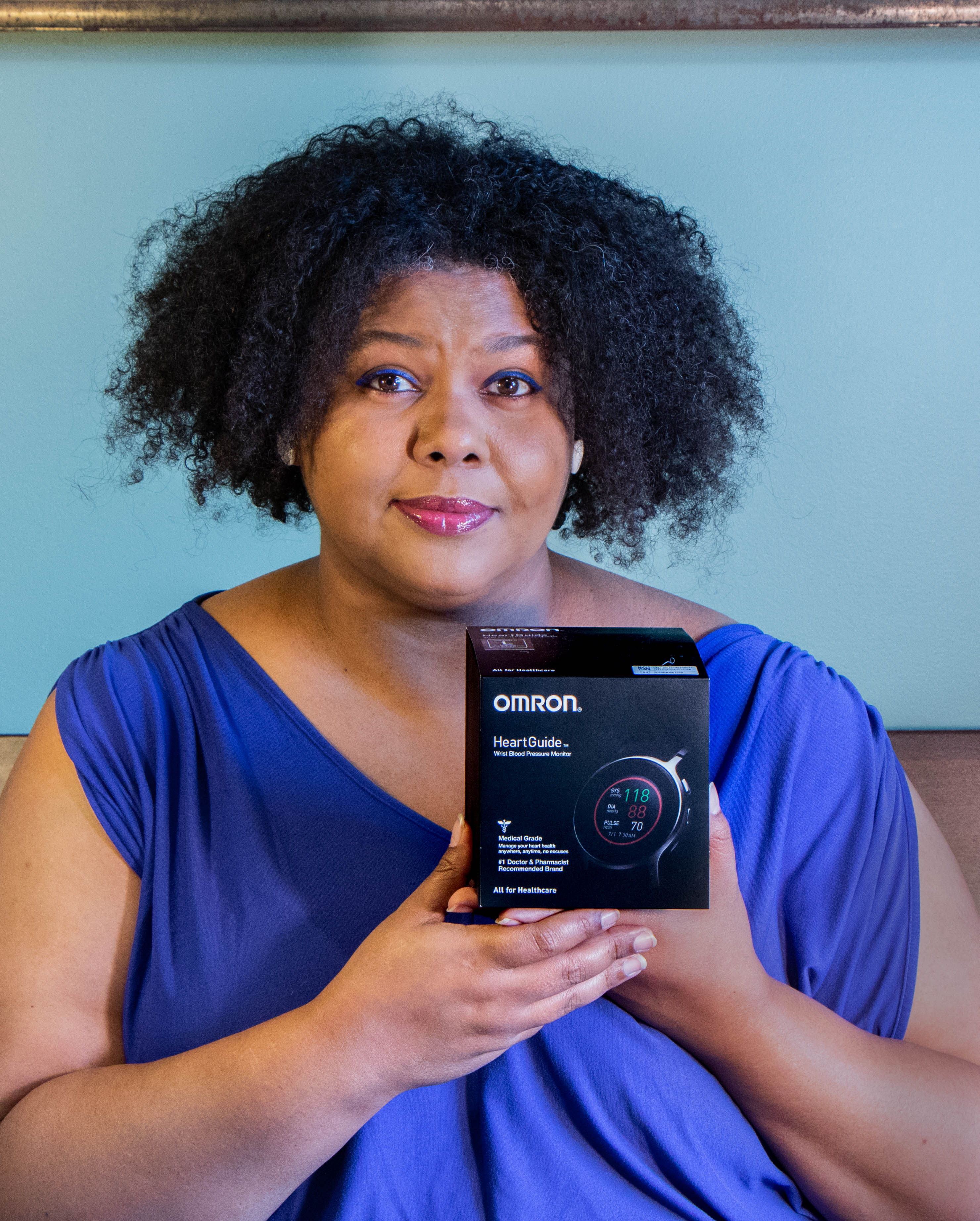
High blood pressure is a major contributing factor to heart attacks, strokes, chronic kidney disease, and more. So many of the health issues in the past in my family can be attributed to it.
Via OMRON, “according to the American Heart Association (AHA), 116 million American adults are in the hypertensive range – more than half of U.S. adults. Of these, 37 million have uncontrolled Stage 2 hypertension, and nearly 13 million are not even aware that they are hypertensive.” That’s scary.
If you’re not aware you’re hypertensive, how do you even find out? You either start regularly monitoring your blood pressure, or you find out the hard way – by suffering a cardiac event. Honestly, the way we’ve been seeing some of our favorite celebs deal with terrible health issues or pass away early makes me wonder how many of us are secretly dealing with high blood pressure, or don’t even know we’ve got it. If you’re regularly monitoring your blood pressure, then you’ll know when it’s high or not. According to the CDC, 80% of cardiac events are preventable. Preventable! CDC studies show that regular self-monitoring can reduce stroke risk by up to 20% and can cut the risk of coronary artery disease by 10%.
There’s a Trini saying my dad uses often, “you have to take in front before in front take you.” That’s what I realize I need to do regarding my blood pressure. Monitoring it regularly will help me to get in front of a potential problem. I’m being cautioned to recognize the risk factors I already have – a family history, my lifestyle and diet, and being Black, period. Literally, statistically, we are more likely to deal with hypertension. An exact quote via OMRON: “The USPSTF suggests annual screening for hypertension in adults 40 years or older and for adults at increased risk for hypertension (such as Black persons, persons with high-normal blood pressure, or persons who are overweight or obese). Screening less frequently (i.e., every 3 to 5 years) is appropriate for adults aged 18 to 39 years not at increased risk for hypertension and with a prior normal blood pressure reading.”
If you read this site often or follow me on social you may already know this, but my mom had triple bypass heart surgery in 2018. It was a big deal. It was difficult for her body and also her mind to fully recover. It has been a challenging road since then. This has been a wake up call for me and my family, to “take in front, before in front takes us.” I need to build a habit of healthy routines based in intentional self-care. That’s what led me to OMRON. They make some amazing blood pressure monitors that help to make the process more accurate and more of a part of my lifestyle. Let me tell you about them!
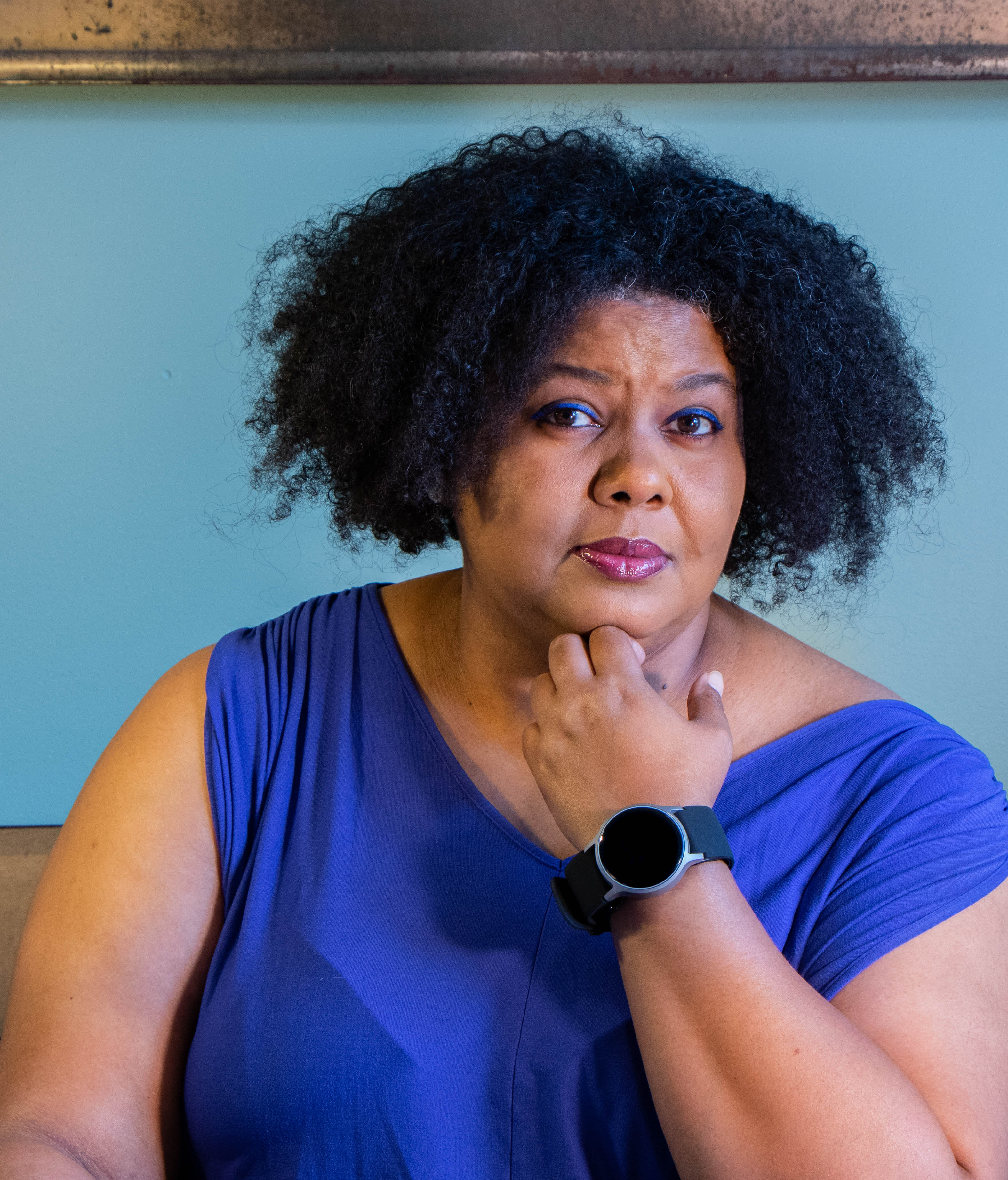
Behold, the OMRON HeartGuide — the first wearable blood pressure monitor. It’s like a smart watch. This device was featured on the cover of TIME Magazine as one of the Best Inventions of the Year in 2019. The HeartGuide uses oscillometric technology – an inflatable cuff similar to what’s used in the doctor’s office – to provide FDA-cleared medical accuracy via wrist measurement. Click here to check out all the details on the HeartGuide product page.
If you’ve had heart issues and want to stay on top of those at home, OMRON has another device well worth knowing about. OMRON Complete is the first blood pressure monitor with EKG capability in a single device for home use. It received FDA clearance and launched in the U.S. in 2019. This is huge for folks with AFib or a family history of irregular heartbeat. According to the CDC, six million Americans are living with AFib and millions more are undiagnosed. AFib patients are at a five-times greater risk of stroke. This device can help folks detect this condition, monitor it, and then share data and insights with their doctor to manage it. It all pairs with a mobile app, OMRON Connect, to store, track, and share your blood pressure and EKG readings with your physician so your stats aren’t affected by White Coat Syndrome, and you have a more consistent idea of what your pressure looks like so you can make necessary changes as recommended.
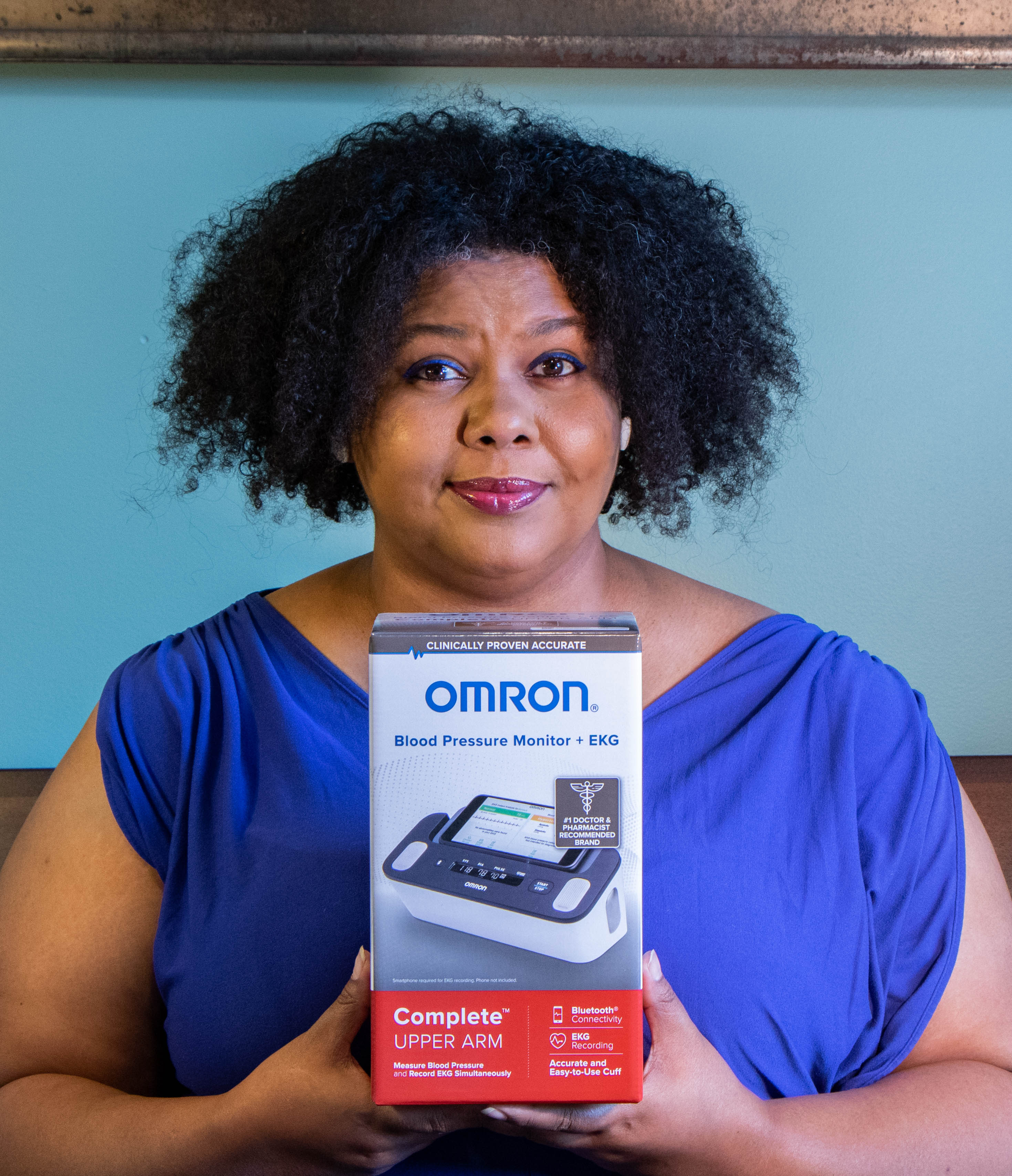
So now I have these devices, we’re living in a post-pandemic Chicago, and it’s time to start showing up for myself differently. I was pretty consistent with my little Zumba classes and getting in physical movement before my fibroid surgery in January 2020, but then my recovery from surgery flowed right into the pandemic and quarantine, and I honestly stopped everything. I started stress baking. Then I gained the pandemic average and I’m not gonna lie, I can feel it in my knees and my feet now. My plantar fasciitis has started bothering me again and I had gotten it under control. I want to get back to a place of feeling fully capable and right now, I’m not there. I need to get back into the habits that helped me get there before. And OMRON has challenged me to make a 90-day decision to start a journey towards improving my heart health. I’m ready. I’m doing it for me, and I’m doing it on the advice from my mom who doesn’t want me to go through what she’s experienced.
Why 90 days, you ask? OMRON’s research shows that it takes up to 90 days of routine practice to form a habit and to make it part of one’s lifestyle. A habit is formed by establishing a cue, acting on a routine, and rewarding yourself for the action. I’m trying to figure out my cue, my routine, and my reward.
My 90-day goals are as follows – to regularly monitor my blood pressure, to get more veggies back into my diet, and to get myself up and moving again consistently for my physical and mental health. I was at a place where exercise felt good, but now I’m back in a place where it’s struggle city. So, my intention this summer is to be a little more active, to be reasonable with myself, but to be less sedentary and confined. Quarantine is over. I’m ready to get out and walk these streets again.
I’m also learning how and when to measure my blood pressure. It has to be when I’m peacefully sitting still. Blood pressure fluctuates during the day, and if you take it after working out, after taking a hot shower, or even after having a cup of coffee, it can throw your measurement off. I’m hearing it’s best to set a consistent time where you’re peaceful after your morning walk, shower, coffee, whatever, and just take it then at the same time every day, more or less. That’s what I’m trying to do. That’s part of building a better and more regulated morning routine that puts my health first. What’s my reward? I haven’t decided yet. But I’m open to suggestions!
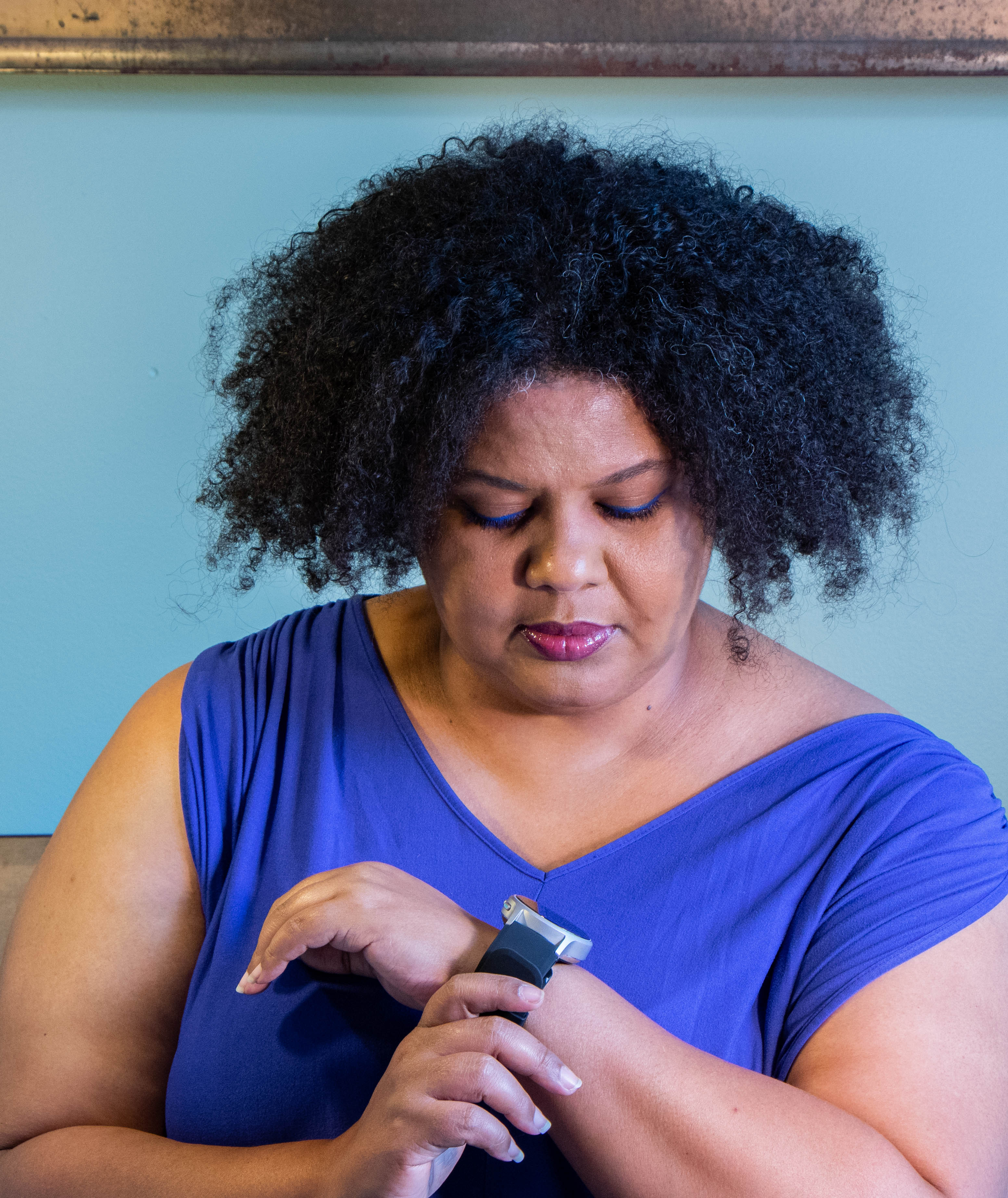
You’re invited to join me in my 90 Days program, if you’re looking to also create habits for yourself and be more aware about better heart health. I want you to note the words I never used throughout this whole post – weight loss. This isn’t about that, for me. I know my triggers and I have been to therapy around these issues, and I find a focus on numbers to be unhelpful to say the least. So please know and understand, my 90 Days goal isn’t about a number on a scale or a number on a clothing tag. I’m trying to make changes that will stick, to make sure I stick around for a long time. Wanna give this a try? Let me know what changes you’re trying to make, to show up for yourself. We got this!
For more information on OMRON or their blood pressure measurement devices, check them out on Facebook, Instagram and Twitter.
This post was sponsored by OMRON but the health history and opinions are all my own.
Excellent content and during this pandemic very apt with all of the stress that these times have brought.
Feel better.
I am doing this with you! I’m 39 and my blood pressure and other stress induced issues have been beating my ass. I’m ready to move more. Thank you for sharing your and your mom’s story.
Hello! Thank you for this really informative and interesting article, I think this information will be useful for many of us. And I want to share some of my tips. Beet juice celery and lemon drop blood pressure and reduce hypertension also flax seed powder in tea or coffee even in juices help to reduce blood pressure and hypertension Ceylon cinnamon will also drop blood pressures I do all of them I went from 150/100 to now 117/83 I do so much more activities I ride a bike again and run overall more things getting done feeling great again.